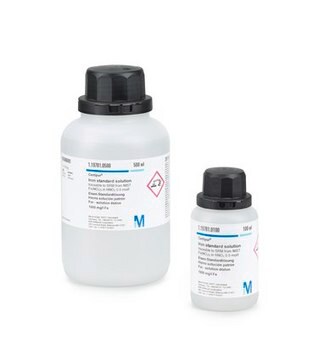203890
Nickel(II) sulfate heptahydrate
99.999% trace metals basis
Synonym(s):
Nickel sulfate heptahydrate, Nickelous sulfate heptahydrate
About This Item
Recommended Products
Quality Level
Assay
99.999% trace metals basis
form
crystals and lumps
impurities
≤15.0 ppm Trace Metal Analysis
density
1.948 g/mL at 25 °C (lit.)
application(s)
battery manufacturing
SMILES string
[Ni++].[H]O[H].[H]O[H].[H]O[H].[H]O[H].[H]O[H].[H]O[H].[H]O[H].[O-]S([O-])(=O)=O
InChI
1S/Ni.H2O4S.7H2O/c;1-5(2,3)4;;;;;;;/h;(H2,1,2,3,4);7*1H2/q+2;;;;;;;;/p-2
InChI key
OGKAGKFVPCOHQW-UHFFFAOYSA-L
Looking for similar products? Visit Product Comparison Guide
General description
Application
- As a vital precursor to generate nickel-rich cathode materials (NMC, NCA) for lithium-ion batteries using co-precipitation process because of its simplicity, ease of scale-up, and ability to produce a homogeneous structure at the particle scale.
- As a nickel source in the electrodeposition process to fabricate the Ni-NTNW (nickel nanotube network), which is then coated with the electroactive NiCo-LDH material to form the hierarchical supercapacitor electrode.
- As a precursor to synthesize the nickel(II) cinnamate complex, which is a key component in the preparation of the metal chelate monomers.
- To synthesize a highly efficient oxygen evolution reaction (OER) trimetallic Fe-Co-Ni electrocatalyst with other metal sulfates .
- To synthesize high entropy alloy for coatings to improve hardness, wear resistance and corrosion resistance.
Features and Benefits
- High purity with trace metal analysis (=< 15 ppm) for 32 elements, suitable for batteries.
- High water solubility ideal for synthesizing composites for various applications.
- Low ppm levels of metal ions including Al, K, Na, Mg, Cu, Co, etc.,7) 99.999% purity is ideal for nickel plating.
Signal Word
Danger
Hazard Statements
Precautionary Statements
Hazard Classifications
Acute Tox. 4 Inhalation - Acute Tox. 4 Oral - Aquatic Acute 1 - Aquatic Chronic 1 - Carc. 1A Inhalation - Muta. 2 - Repr. 1B - Resp. Sens. 1 - Skin Irrit. 2 - Skin Sens. 1 - STOT RE 1 Inhalation
Target Organs
respiratory tract irritation
Storage Class Code
6.1D - Non-combustible acute toxic Cat.3 / toxic hazardous materials or hazardous materials causing chronic effects
WGK
WGK 3
Flash Point(F)
Not applicable
Flash Point(C)
Not applicable
Personal Protective Equipment
Choose from one of the most recent versions:
Already Own This Product?
Find documentation for the products that you have recently purchased in the Document Library.
Customers Also Viewed
Articles
In many technologies, performance requirements drive device dimensions below the scale of electron mean free paths (λe). This trend has increased scientific interest and technological importance of electrical resistivities at the nanoscale.
Lithium-Ion Battery Performance: Dependence on Material Synthesis and Post‑Treatment Methods
Plasmonic nanoparticles have unique optical properties that can be tailored to suit a variety of applications in the biotechnology1–8 and electronics9–16 industries.
Our team of scientists has experience in all areas of research including Life Science, Material Science, Chemical Synthesis, Chromatography, Analytical and many others.
Contact Technical Service













